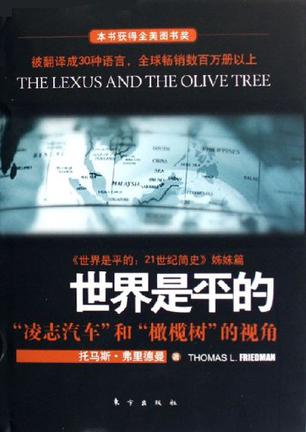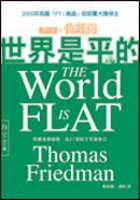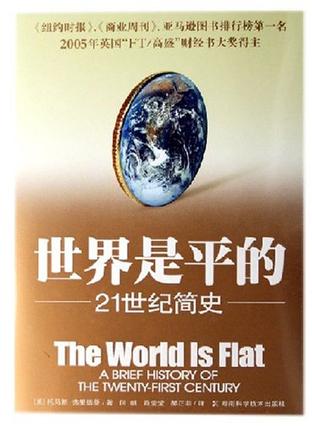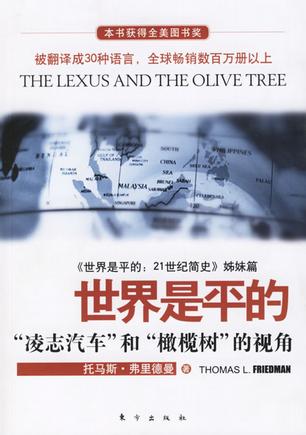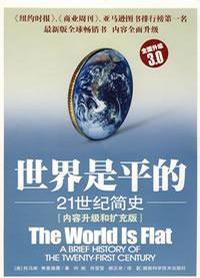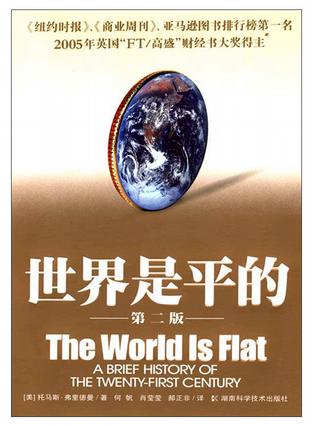欢迎来到相识电子书!
标签:世界是平的
-
The World Is Flat
这是一本: 对世界经济及商业最富洞察力和预见性的巨作! 被比尔·盖茨、等全球商业领袖顶礼膜拜的里程碑作品 唯一一位3次获得普利策奖的财经作家 连续64周销量位居亚马逊书店十大畅销书之列 全球销售近1000万册 诺贝尔经济学奖得主斯蒂格利茨推荐 IBM大中华区总裁兼首席执行官周伟焜强烈推荐 IBM全体员工人手一册 《金融时报》与高盛2005年度最佳商业图书 When scholars write the history of the world twenty years from now, and they come to the chapter Y2K to March 2004, what will they say was the most crucial development? The attacks on the World Trade Center on 9/11 and the Iraq war? Or the convergence of technology and events that allowed India, China, and so many other countries to become part of the global supply chain for services and manufacturing, creating an explosion of wealth in the middle classes of the world's two biggest nations, giving them a huge new stake in the success of globalization? And with this flattening of the globe, which requires us to run faster in order to stay in place, has the world gotten too small and too fast for human beings and their political systems to adjust in a stable manner? In this brilliant new book, the award-winning New York Times columnist Thomas Friedman demystifies the brave new world for readers, allowing them to make sense of the often bewildering global scene unfolding before their eyes. With his inimitable ability to translate complex foreign policy and economic issues, Friedman explains how the flattening of the world happened at the dawn of the twenty-first century; what it means to countries, companies, communities, and individuals; and how governments and societies can, and must, adapt. The World Is Flat is the timely and essential update on globalization, its successes and discontents, powerfully illuminated by one of our most respected journalists. : Thomas L. Friedman is not so much a futurist, which he is sometimes called, as a presentist. His aim in The World Is Flat, as in his earlier, influential Lexus and the Olive Tree, is not to give you a speculative preview of the wonders that are sure to come in your lifetime, but rather to get you caught up on the wonders that are already here. The world isn't going to be flat, it is flat, which gives Friedman's breathless narrative much of its urgency, and which also saves it from the Epcot-style polyester sheen that futurists--the optimistic ones at least--are inevitably prey to. What Friedman means by "flat" is "connected": the lowering of trade and political barriers and the exponential technical advances of the digital revolution that have made it possible to do business, or almost anything else, instantaneously with billions of other people across the planet. This in itself should not be news to anyone. But the news that Friedman has to deliver is that just when we stopped paying attention to these developments--when the dot-com bust turned interest away from the business and technology pages and when 9/11 and the Iraq War turned all eyes toward the Middle East--is when they actually began to accelerate. Globalization 3.0, as he calls it, is driven not by major corporations or giant trade organizations like the World Bank, but by individuals: desktop freelancers and innovative startups all over the world (but especially in India and China) who can compete--and win--not just for low-wage manufacturing and information labor but, increasingly, for the highest-end research and design work as well. (He doesn't forget the "mutant supply chains" like Al-Qaeda that let the small act big in more destructive ways.) Friedman has embraced this flat world in his own work, continuing to report on his story after his book's release and releasing an unprecedented hardcover update of the book a year later with 100 pages of revised and expanded material. What's changed in a year? Some of the sections that opened eyes in the first edition--on China and India, for example, and the global supply chain--are largely unaltered. Instead, Friedman has more to say about what he now calls "uploading," the direct-from-the-bottom creation of culture, knowledge, and innovation through blogging, podcasts, and open-source software. And in response to the pleas of many of his readers about how to survive the new flat world, he makes specific recommendations about the technical and creative training he thinks will be required to compete in the "New Middle" class. As before, Friedman tells his story with the catchy slogans and globe-hopping anecdotes that readers of his earlier books and his New York Times columns know well, and he holds to a stern sort of optimism. He wants to tell you how exciting this new world is, but he also wants you to know you're going to be trampled if you don't keep up with it. A year later, one can sense his rising impatience that our popular culture, and our political leaders, are not helping us keep pace. --Tom Nissley Before 9/11, New York Times columnist Friedman was best known as the author of The Lexus and the Olive Tree, one of the major popular accounts of globalization and its discontents. Having devoted most of the last four years of his column to the latter as embodied by the Middle East, Friedman picks up where he left off, saving al-Qaeda et al. for the close. For Friedman, cheap, ubiquitous telecommunications have finally obliterated all impediments to international competition, and the dawning "flat world" is a jungle pitting "lions" and "gazelles," where "economic stability is not going to be a feature" and "the weak will fall farther behind." Rugged, adaptable entrepreneurs, by contrast, will be empowered. The service sector (telemarketing, accounting, computer programming, engineering and scientific research, etc.), will be further outsourced to the English-spoken abroad; manufacturing, meanwhile, will continue to be off-shored to China. As anyone who reads his column knows, Friedman agrees with the transnational business executives who are his main sources that these developments are desirable and unstoppable, and that American workers should be preparing to "create value through leadership" and "sell personality." This is all familiar stuff by now, but the last 100 pages on the economic and political roots of global Islamism are filled with the kind of close reporting and intimate yet accessible analysis that have been hard to come by. Add in Friedman's winning first-person interjections and masterful use of strategic wonksterisms, and this book should end up on the front seats of quite a few Lexuses and SUVs of all stripes. Although it may be catchy, the title of New York Times columnist Friedman's latest book needs explaining. "Flat" here means "level," as in the level playing field on which virtually any nation can now compete, thanks to the explosion of global telecommunications, including the Internet as well as the transfer of information from First World to Third--and back. There's also a leveling of hierarchies within organizations, thanks to the increasing democratization of information from sources such as the Web. Friedman cites 10 forces that have caused this "flattening," including the fall of the Berlin Wall ("We could not think globally about the world when the Berlin Wall was there," said one economist), the emergence of Netscape as an Internet platform, workflow software, open sourcing, outsourcing, the streamlining of the supply chain (witness Wal-Mart), the organization of information on the Internet (Google, Yahoo), and the ubiquity of powerful personal telecommunications devices. Friedman is very thorough at projecting the consequences of these changes, noting the benefits we all share from this hyper-globalization, while realistically addressing, for example, the challenges American workers will face in the coming decades from talented, highly motivated workforces in such countries as India and China. A little more humor might have offset the author's trademark earnestness; still, as he has with other global issues, Friedman brings coherence and a workable plan of action to the fundamental changes our world is experiencing. Alan Moores Adult/High School–This brilliantly paced, articulate, and accessible explanation of today's world is an ideal title for tech-savvy teens. Friedman's thesis is that connectedness by computer is leveling the playing field, giving individuals the ability to collaborate and compete in real time on a global scale. While the author is optimistic about the future, seeing progress in every field from architecture to zoology, he is aware that terrorists are also using computers to attack the very trends that make progress plausible and reasonable. This is a smart and essential read for those who will be expected to live and work in this new global environment –Alan Gropman, National Defense University, Washington, DC Distance has been annihilated. Your X rays are sent to India, your job to China. In a flat world the U.S. must seize every technological advantage and put the "oomph" we gave the moon shot into breaking our oil habit. (Although the writer suspects that he will be sent to the moon before "W." gets the message.) Narrator Oliver Wyman does a superb job. First he's the irrepressible American, then the Indian gentleman, and finally the Chinese whose English is formal but broken. The audiobook technology that enables us to take in so much information while caught in traffic or scrubbing a pan is precisely the sort of handhold Friedman would urge us all to grasp, and with both hands. B.H.C. Winner of AudioFile Earphones Award Friedman, nominally a liberal, has historically taken the middle path and supported laissez-faire capitalism, globalization, and the power of institutions like the International Monetary Fund. Ever optimistic about globalization, he pleases its proponents and disappoints its detractors in The World Is Flat. There’s no doubt that Friedman asks timely questions, even if he sometimes shirks definitive answers. Although he acknowledges terrorism’s global weight, he identifies an even more potent force shaping global economics and politics: the "triple convergence—of new players, on a new playing field, developing new processes … for horizontal collaboration," particularly in China and India. Friedman’s story comes alive as we meet the movers and shakers of Globalization 3.0, eavesdrop on Friedman’s interviews, and witness collaborations in progress. Friedman’s personal journey, if slightly padded, makes for entertaining and accessible reading. Yet critics, even those who support globalization, differed on Friedman’s thesis; India, for example, has not yet become the global superpower he describes; many scholars still describe the "flat world" as a nicer name for "cheap labor." Friedman also less effectively analyzes the effects of Globalization 3.0 than its players, and embraces technological determinism at the expense of thoroughly considering major political factors (like terrorist networks, which he’s previously compared to World War III). No matter your stance on the benefits or pitfalls of globalization, The World Is Flat is an important, thought-provoking book—even if Friedman’s answer to unresolved issues is, "Sort that out." Thomas L. Friedman has won the Pulitzer Prize three times for his work at The New York Times. He is the author of three best-selling books: From Beiruit to Jerusalem (FSG, 1989), winner of the National Book Award for nonfiction and still considered to be the definitive work on the Middle East, The Lexus and the Olive Tree: Understanding Globalization (FSG, 1999), and Longitudes and Attitudes: Exploring the World After September 11 (FSG, 2002). He lives in Bethesda, Maryland, with his family. 《世界是平的》中文版 精装版 《世界是平的》中文版 《世界是平的》中文版 平装版 -
世界是平的
《世界是平的》是托马斯·弗里德曼用了4年时间写成的一本重点论述“全球化” 的专著。此书的论点是:全球化不只是一种现象,也不只是一种短暂的趋势。它是一种取代冷战体系的国际体系。全球化是资本、技术和信息超越国界的结合,这种结合创造了一个单一的全球市场,在某种程度上也可以说是一个全球村。 弗里德曼在书里用生动的故事、已有的术语和概念,描绘了全球化这种体系。他突出了“凌志汽车”和“橄榄树”的冲突,全球化体系和文化、地理、传统以及社会的古老力量之间的紧张状态。他还详尽地叙说了全球化在那些感觉到全球化残酷性的人群中所产生的强烈反作用。他清楚地说明了应该如何才能保证这一体系的平衡。 他在书中把冷战与全球化作了对比。他认为: 如果冷战是一项体育运动,那么它就是相扑;如果全球化是一项体育运动,那么它就是100米冲刺一次,又一次,不断冲刺。 冷战的标志是,它隔开了每一个人;全球化的标志是因特网,它将每一个人连接在一起。 冷战体系的界定是根据条约,全球化体系是界定根据交易。 如果冷战时期最明显的不安是在固定和稳定的世界里,被你十分了解的敌人所击败,那么在全球化时期,最明显的不安,就是害怕一个你看不见、摸不着且感觉不到的敌人所带来的迅速变化,你的生活会在任何时候被无形的经济和技术力量所改变。 在冷战时期,我们有白宫和克里姆林宫之间的热线,它是一种标志,表明我们被分开了,但至少两个超级大国还负责任。在全球化时期,我们有因特网——它是一种标志,表明我们都连为一体,但没有负责。 在冷战时期,问得最多的一个问题是,“你们的导弹有多大?”在全球化时期,问得最多的一个问题是,“你的调制解调器有多快?” -
世界是平的
紐約時報、BusinessWeek、Amazon #1暢銷書 美國半年內銷售破百萬冊 EQ之後最轟動的趨勢話題 小時候我常聽爸媽說:「兒子啊,乖乖把飯吃完,因為中國跟印度的小孩沒飯吃。」現在我則說:「女兒啊,乖乖把書唸完,因為中國跟印度的小孩正等著搶你的飯碗。」 這是比爾蓋茲已經推薦過N遍的一本書。他說,這是一本所有決策者、企業員工都必須讀的一本書。 《BusinessWeek》說,所有的MBA都在讀《世界是平的》。《財星》雜誌說,全美國的州長、國會議員都在談《世界是平的》。大學校長在畢業典禮建議,進職場前應該先讀《世界是平的》。有的商學院甚至要新生來報到前就先把《世界是平的》讀過。 只要有寬頻,只要有雄心,不管你在哪裡,都不會被邊緣化。因為,競爭的立足點變平等了,小蝦米和大鯨魚可以平起平坐了。 拜科技之賜,即使在家裡開一個工作室,一個人也可以和大企業搶生意。同樣的,大企業也可以比小公司更靈活,更細膩。從前做夢都沒想到的,今天不只變可能,甚至是必要了。 抹平的世界,也是無限商機的世界。 (摘自博客來網路書店) -
世界是平的
★对世界经济及商业最富洞察力和预见性的巨作! ★被比尔·盖茨、等全球商业领袖顶礼膜拜的里程碑作品 ★唯一一位3次获得普利策奖的财经作家 ★连续64周销量位居亚马逊书店十大畅销书之列 ★全球销售近1000万册 ★诺贝尔经济学奖得主斯蒂格利茨推荐 ★IBM大中华区总裁兼首席执行官周伟焜强烈推荐 ★IBM全体员工人手一册 ★《金融时报》与高盛2005年度最佳商业图书 [前所未有的全球化] 弗里德曼一针见血的指出了世界未来的方向,“全球化3.0”将深刻地影响我们的经济、社会、政治生活的各个方面,改变每个人的工作方式、生活方式乃至生存的方式。不论是政府部门、商业部门、社会部门,各行各业的管理者、员工还是自由职业者,概莫能免。新一波的全球化,正在抹平一切疆界,世界变平了,从小缩成了微小。 在本书中,弗里德曼还剖析了十股造成世界平坦化的重要力量,启发人们思考,当前的潮流,对国家、公司、团体或个人而言,到底意味着什么? [全球化的三个阶段] 在《世界是平的》一书中,弗里德曼将全球化划分为三个阶段。 ○“全球化1.0”主要是国家间融合和全球化,开始于1492年哥伦布发现“新大陆”之时,持续到1800年前后,是劳动力推动着这一阶段的全球化进程,这期间世界从大变为中等。 ○“全球化2.0”是公司之间的融合,从1800年一直到2000年,各种硬件的发明和革新成为这次全球化的主要推动力——从蒸汽船、铁路到电话和计算机的普及,这其间因大萧条和两次世界大战而被迫中断,这期间世界从中等变小。 ○而在“全球化3.0”中,个人成为了主角,肤色或东西方的文化差异不再是合作或竞争的障碍。软件的不断创新,网络的普及,让世界各地包括中国和印度的人们可以通过因特网轻松实现自己的社会分工。 [权威评价] 伟大的著作的一个标志就是它可以使你从新的角度来看世界,弗里德曼的这本书成功地做到了这一点。 ——斯蒂格利茨,诺贝尔经济学奖得主 这本一年来全球最畅销的商业书籍以丰富生动的语言描述了全球化带来的挑战和益处,提出了现代商业课题中最令人瞩目和引人入胜的真知灼见。弗里德曼是当之无愧的获奖者。 ——《金融时报》与高盛年度最佳商业图书评委会评语 《世界是平的》英文原版 《世界是平的》英文原版第三版 -
世界是平的
本书不是托马斯·弗里德曼2005年所著畅销全球的《世界是平的:21世纪简史》姊妹篇,是他在1999年写就的另一本关于全球化的论著,原名《理解全球化:“凌志汽车”和“橄榄树”》。出版者认为,引进这本关于全球化的论著,有助于中国读者更好的理解托马斯曼的观点。 本书曾被翻译成30种语言,全球畅销数百万册以上。弗里德曼在书里用生动的故事、已有的术语和概念,描绘了全球化这种体系。他突出了“凌志汽车”和“橄榄树”的冲突——全球化体系和文化、地理、传统以及社会的古老力量之间的紧张状态。他还详尽地叙说了全球化在那些感觉到全球化残酷性的人群中所产生的强烈反作用。他清楚地说明了应该如何才能保证这一体系的平衡。 本书是托马斯·弗里德曼用了4年时间写成的一本重点论述“全球化”的专著。此书的论点是:全球化不只是一种现象,也不只是一种短暂的趋势。它是一种取代冷战体系的国际体系。全球化是资本、技术和信息超越国界的结合,这种结合创造了一个单一的全球市场,在某种程度上也可以说是一个全球村。 弗里德曼在书里用生动的故事、已有的术语和概念,描绘了全球化这种体系。他突出了“凌志汽车”和“橄榄树”的冲突——全球化体系和文化、地理、传统以及社会的古老力量之间的紧张状态。他还详尽地叙说了全球化在那些感觉到全球化残酷性的人群中所产生的强烈反作用。他清楚地说明了应该如何才能保证这一体系的平衡。 他在书中把冷战与全球化作了对比。他认为: 如果冷战是一项体育运动,那么它就是相扑;如果全球化是一项体育运动,那么它就是100米冲刺——一次,又一次,不断冲刺。 冷战的标志是,它隔开了每一个人;全球化的标志是因特网,它将每一个人连接在一起。 冷战体系的界定是根据条约,全球化体系是界定根据交易。 如果冷战时期最明显的不安是在固定和稳定的世界里,被你十分了解的敌人所击败,那么在全球化时期,最明显的不安,就是害怕一个你看不见、摸不着且感觉不到的敌人所带来的迅速变化——你的生活会在任何时候被无形的经济和技术力量所改变。 在冷战时期,我们有白宫和克里姆林宫之间的热线——它是一种标志,表明我们被分开了,但至少两个超级大国还负责任。在全球化时期,我们有因特网——它是一种标志,表明我们都连为一体,但没有负责。 在冷战时期,问得最多的一个问题是,“你们的导弹有多大?”在全球化时期,问得最多的一个问题是,“你的调制解调器有多快?” -
世界是平的(3.0版)
世界变得平坦,是不是迫使我们跑得更快才能拥有一席之地? 在《世界是平的》中,托马斯·弗里德曼描述了当代世界发生的重大变化。科技和通信领域如闪电般迅速的进步,使全世界的人们可以空前地彼此接近——在印度和中国创造爆炸式增长的财富;挑战我们中的一些人,比他们更快占领地盘。3.0版新增两章,更新了报告和注释方面的内容,这些内容均采自作者考察世界各地特别是整个美国中心地带的见闻,在美国本土,世界的平坦化正在剧烈地改变人们的生活方式。 托马斯·弗里德曼首先展示了“全球化正在滑入扭曲飞行的原因和方式”(罗伯特·莱特),揭开这个世界的神秘面纱,深入浅出地讲述复杂的外交政策和经济问题,为读者释疑解惑。作者通过其对复杂外交政策和经济问题的非凡的解读能力,解释了世界的平坦化趋势是如何在21世纪来临之时发生的;这个趋势对于国家、公司、社会和个人而言意味着什么;政府和组织如何才能接受而且必须接受;为什么恐怖分子仍然想继续妄为。由托马斯·弗里德曼撰写的《世界是平的》,被认为是全球化的基本读物。 -
世界是平的
当学者们讨论世界这20年发展的历史,并把目光聚集在2000年到2004年3月这一段时间时,他们将说些什么?9·11恐怖袭击还是伊拉克战争?或者,他们将讨论:科技的汇集与传播使得印度、中国和许多发展中国家成为世界商品和服务产品供给链上的一员,从而为世界大的发展中国家中的中产阶级带来了大量的财富,使这两个国家在全球化浪潮中占据更有利的位置?随着世界变得平坦,我们必须以更快的速度前进,才能在竞争中赢得胜利?这个世界是否变得如此之小、变化如此之快,从而使我们的政治体系无法调整到与之相适应的稳定结构? 托马斯·弗里德曼揭开了笼罩在这个世界上的神秘面纱,深入浅出地讲述复杂的外交政策和经济问题,为读者们释疑解惑。他解释到,世界的平坦化趋势是如何在21世纪初发生的?这个趋势对于国家、公司、社会和个人而言意味着什么?政府与社会要做出而且必须做出怎样的调整以应付这种趋势《世界是平的》及时地就全球化中的这些问题——全球化取得的成功和其面临的挑战——进行了分析。
热门标签
下载排行榜
- 1 梦的解析:最佳译本
- 2 李鸿章全传
- 3 淡定的智慧
- 4 心理操控术
- 5 哈佛口才课
- 6 俗世奇人
- 7 日瓦戈医生
- 8 笑死你的逻辑学
- 9 历史老师没教过的历史
- 10 1分钟和陌生人成为朋友


